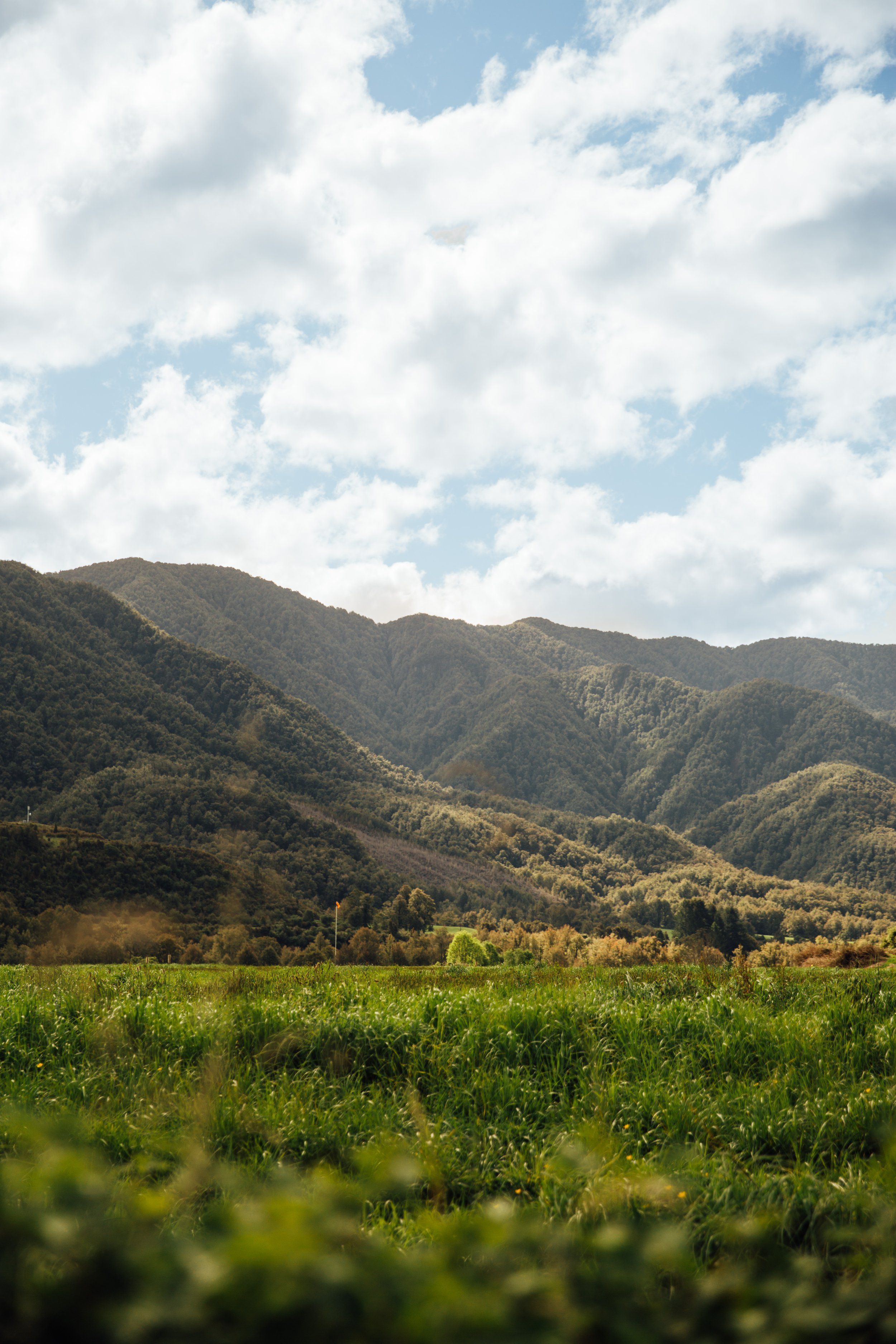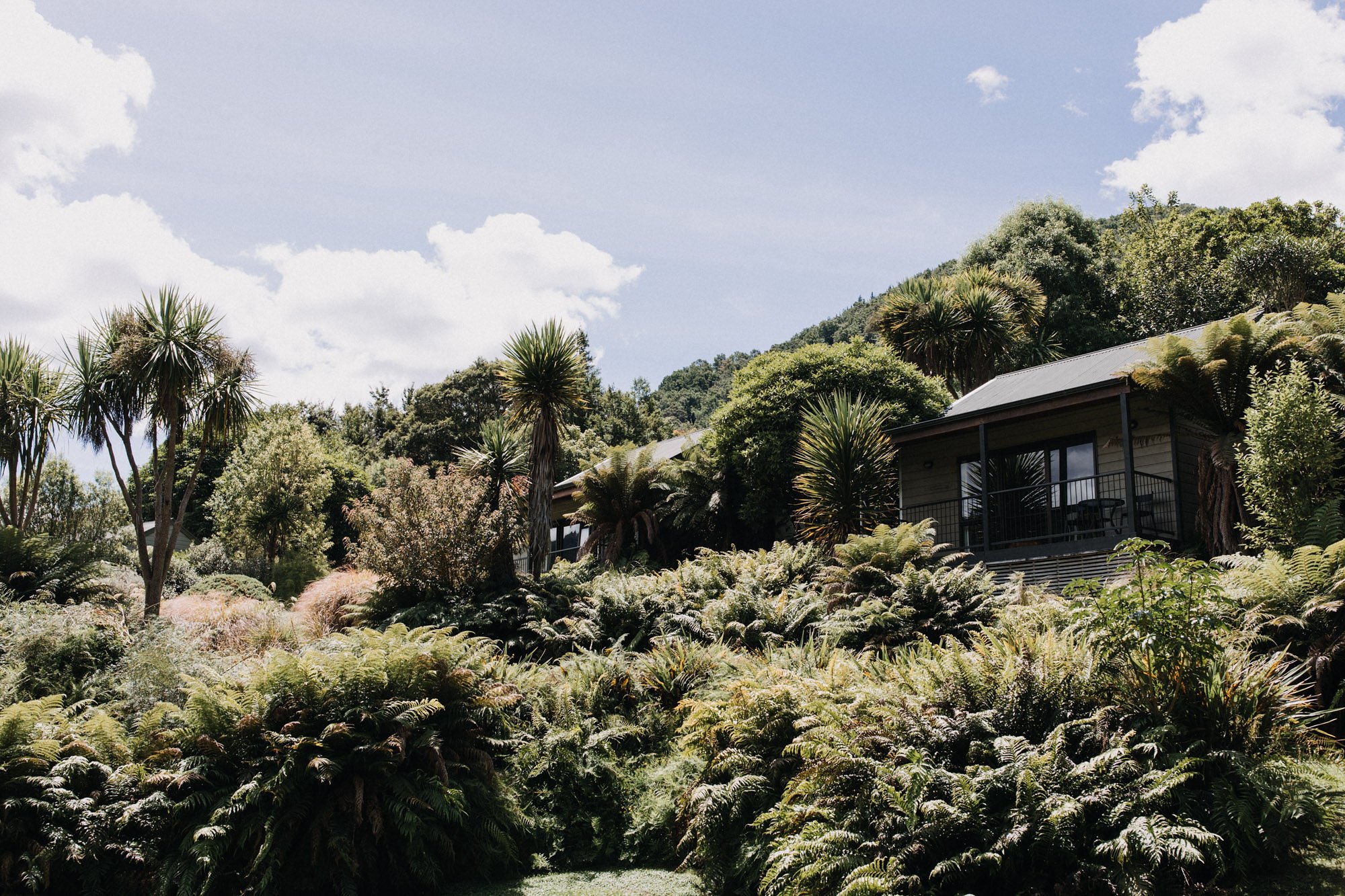How to Mindfully Travel with Maruia River Retreat
Written by Tess Cimino and republished at Sustain Magazine’s April 2023 issue.
Tui’s, kākā, and South Island robins whistle amongst the silver beech forest melting with sparkling, wispy moss at Maruia River Retreat’s 180 hectares of native bush. Amongst the rainforest, there is a feeling of peace beneath the laurel trees. A hum hangs from the rushing river, buzzing bees and crunching moss beneath hiking boots. The topsoil is dense, scattered with fluffy ferns and vivid turkey mushrooms.
Maruia River Retreat’s 180 hectares of native bush
Entering through the bronze gates off Highway 6, only a few feet away from the road, there is a shift from speeding cars to a slower way of life. A growing food forest on the right, filled with wild blackberries, peach trees, and tomatoes, to name a few, welcomes guests. On the left, there is the retreat. A dining room, bar, and outdoor patio hold a soft, warm glow with natural light, cool breezes, and comfy lounging. A wellness studio with high ceilings, cedar saunas, and the forest waving through large windows. A collection of villas propped up against the hill facing the river with rolling views of bright green and clear water from the patio. Beneath it all, there is a community holding space for mindfulness, meditation, and sustainability through slow food, hands-on yoga, conscious forest bathing, and guided nature walks.
The Villas
Every night around seven, guests gather for their three-course meals together in the same room. From vegan sun-dried tomato pâtė to wild, local venison, there is something for everyone to enjoy. Butter leaf salads and zucchini from the garden are always a staple. Serving everything simultaneously so guests can start and finish at the same time, inviting space for conversation and connection. Tables are often scooched together to further discussions amongst new friends after meeting on the nature walk earlier that morning. Bonding after holding on to one another while crossing slippery streams and tasting the bitter leaves of the native Horopito tree.
The staff are environmentalists at heart. With backgrounds in environmental education, renewable electricity, and eco-resort management, direct ties bring the outdoors in. It’s comforting knowing that the tea bags collecting in the terracotta bowl next to the self-service coffee bar are composting along with other kitchen food scraps and yard clippings.
In two years, the Maruia River Retreat will be fully electric - harvesting the river’s power through an on-site hydro plant. Guests see this development on the Saturday morning nature walk guided by Lasse, a professional scuba diver, yoga teacher, and retreat co-owner. If they’re lucky, Ronda, an exuberant Rhodesian Ridgeback, might be their new favorite leader running by their side. Wandering below the lancewood trees and over streams of brown trout with a dog friend might be the most wholesome experience. In less than an hour, guests will see waterfalls, rivers, streams, hydro plants, mountains, and over 20 species of native trees, bushes, and animals. There is a newfound appreciation and understanding of where guests stay for the next few days. This forest is their home, and there isn’t anything they would now want to do to hurt it.
The surrounding area is mostly farmland. Native West Coast forests have been cleared for cows and sheep to roam. Thousands of birds and flowers lost their habitat because of this. At the retreat, the old growth of the Kahurangi National Park remains with over 15 rare bird species, unique flora, and other fauna sprawling with life. A life that dances and plays above and below sacred paths leading to an oasis of consciousness. Forest bathing might seem like a hot tub, sauna, and shower amongst the trees, but it’s more than that. Its stillness, floating amongst the clear 40-degree water while rain pats amongst beech tree leaves. Birds and insects wander without thinking of being seen. The cold shower embedded into the California redwood tree from ancient Maori planting it as a marking sign, shallows the breath. Making the rush of freezing water come down like sap off the thick bark. Goosebumps turn to sweat while jogging up the pebble path into the outdoor sauna in the bush. Life has been the only thing on the mind for that embedded, private daily bathing hour, being amongst the sprawling forest. Somehow, even more than ever, there is this intrinsic need to protect and nourish this land, these animals, and that feeling of oneness with the earth—that feeling of being home.
Yoga is at the core of the retreat, with classes starting at eight each morning. The studio is filled with around eight guests ages 30 to 70, novice and practiced yogis lie mat-to-mat facing the silver gong and sheepskin rug at the front of the room. There is a focus on the breath, gentle reminders to be kind with yourself, to let the mind be soft and the body smoother. Cristina, the other co-owner, observes each guest, adjusting and guiding them for more time than in your average yoga studio. Cicadas and sparrows chirping feed in through the windows. Silver ferns tap on the glass, allowing a shift from the mat back to the outdoors. With an open mind, guests make their way to breakfast at nine. Honeycomb from the farm next door is the centerpiece of the buffet. Fresh homemade bread, blueberries from the bush out back, and eggs from the neighbor up the road are tastier after the workout.
Honeycomb from the farm next door
Yoga, breakfast, dinner, massages, nature walks, forest bathing, and time spent by the river are the experiences at the retreat that will leave guests wanting more. Yearning to feel that sense of utter calm and connection with nature. Knowing where guests stay is thinking about and caring for the environment - the new gold standard of mindful travel. Also, contributing towards an environmental fee to have a fully carbon-neutral trip is what Maruia River Retreat strives for and what other resorts should too. In an age of mindless scrolling and missed connections, Maruia feeds the mind, body, and soul in a much-needed and forever reminiscing way.





